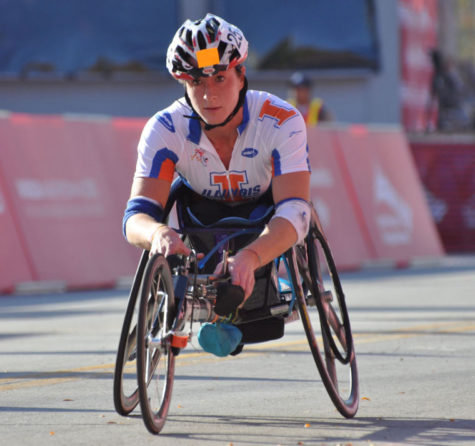Illinois’ wheelchair track program continues to thrive
April 26, 2017
The University of Illinois has a longstanding tradition of having its physically disabled athletes compete at the Paralympic games.
Illinois’ wheelchair track team is one of three college track teams in the nation that offers competition to people with disabilities.
“What’s unique about the University of Illinois is that there is nothing else like this in the world,” five-time Paralympian Tatyana McFadden said in a USA Today article. “If you want athletes to succeed, we need facilities like the University of Illinois.”
A staff composed of multiple Paralympic athletes is at the core of the program’s achievement. The team also has an arsenal of technology that allows athletes to compete at the most elite level possible.
“We function similar to the track team here at U of I,” wheelchair track head coach Adam Bleakney said. “We’re out on the track six days a week and have worked to build some world-class athletes.”
Some of those athletes include McFadden and three-time Paralympian and wheelchair 800 meter world record holder Josh George. Both athletes have graduated from Illinois, but their legacies live on through the University’s current wheelchair athletes.
Bleakney, a four-time Paralympian and IPC world championship finalist, trained under previous wheelchair track coach Marty Morse before taking over. However, his debut into wheelchair athletics was not as smooth as his experiences are today.
Bleakney was introduced to wheelchair racing in 1996. After a spinal cord injury, the Paralympian’s only goal was to graduate from community college and attend Illinois for its renowned accessible campus. However, after arriving in Champaign, Bleakney’s world changed.
By 2002, Bleakney was a competitor on Team USA at the World Championships in Lille, France. He debuted on the marathon scene after finishing first and second in the Chicago Marathon and Columbus Marathon, respectively.
As the years — and training cycles — passed, Bleakney began to develop into a top competitor on the track. By 2006, he had not only raced five more marathons, placing first in two of them, but also earned a first-place finish in the 400 meter at the Swiss National Championships. Bleakney also competed in the 2000, 2004, 2008 and 2012 Paralympics and won a silver medal in the 800 meter in Athens.
Bleakney most recently took 13 athletes from Illinois to the 2016 Paralympics in Rio de Janeiro, Brazil. However, a majority of his athletes have found success away from the track. Although the team competes in shorter distances, it also has the capability of contending for podium places over 26.2 miles.
Bleakney said more than a dozen athletes were planning on tackling back-to-back marathons; 10 athletes raced first in Boston and then in London days later.
In order to compete in longer distances, the athletes said they focus on two things the team at Illinois is no stranger to: speed and mileage.
“On an average week, we probably are at 200 to 220 miles,” Bleakney said. “About 75 percent of our bulk is on the track. We have an emphasis on quality; we’re very quality driven. At our peak volume, we put in about 15-20 hours a week cycling.”
Although the college wheelchair track team undergoes a large training load, Bleakney said that he also emphasizes regeneration. He said athletes’ focus toward a specific event dictates their training.
“Before anything, I want to build healthy human beings,” Bleakney said. “We have world-class athletes, but building good daily skills and nutritional skills is just as important as competition. Once you get all of those together, you are able to do so much more.”
The team trains through most of the year with a break in late December. For marathoners, the season begins in the spring.
“The best marathoners are the gold-medalist 800-meter athletes,” Bleakney said. “Speed is a huge component. Once you get the speed down, you can build upon it.”
For the majority of University students, wheelchair athletics is a part of a hidden world, but as time goes on, they gain more notoriety for their achievements.







